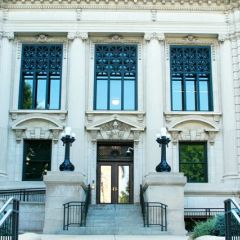As a lawyer doing asbestos litigation for the Metro East firm Simmons Hanley Conroy, Karoline Carstens of Alton has honed her deposition-taking skills to a sharp edge. In the latest issue of ISBA's YLDNews, she shares some of her expertise with lawyers who have little or no experience deposing witnesses.
For example, she underscores the importance of knowing the applicable procedural rules."[I]f your case is filed in Illinois state court, read through the Illinois Rules of Civil Procedure, especially Rules 201-224 on discovery and depositions," she writes.
Also, Carstens advises, "[b]e aware that many courts have local rules and standing orders that address the deposition process. It is very important to know these rules. I often bring a copy of the standing order that governs many of my cases to depositions in the event a dispute arises."
And that dispute might oblige you to reach out to the judge, she writes. "Once in a great while, a disagreement may require the immediate intervention of the judge assigned to your case. It is beneficial to know whether your judge is agreeable to being called during a deposition. If so, keep the phone number handy just in case." Read her article for tips about handling objections, how and why to prepare thoroughly, and more.


 The Illinois Supreme Court Building officially re-opened to the public Wednesday after a 13-month restoration. View our photo gallery of the restoration at
The Illinois Supreme Court Building officially re-opened to the public Wednesday after a 13-month restoration. View our photo gallery of the restoration at  ISBA Past President Tom Leahy, 62, of Chicago and Lake Geneva, Wisconsin, died Saturday, August 23 after a short and valiant struggle with cancer. He served as ISBA President from 1993-1994 and as Chairman of ISBA Mutual Insurance Company from 1995-1996. Visitation will take place at 10 a.m. on Thursday, Aug. 28 at St. Clement Church, 642 W. Deming Pl., Chicago until celebration of Life Mass at noon. Private interment at Graceland Cemetery will take place at a later date
ISBA Past President Tom Leahy, 62, of Chicago and Lake Geneva, Wisconsin, died Saturday, August 23 after a short and valiant struggle with cancer. He served as ISBA President from 1993-1994 and as Chairman of ISBA Mutual Insurance Company from 1995-1996. Visitation will take place at 10 a.m. on Thursday, Aug. 28 at St. Clement Church, 642 W. Deming Pl., Chicago until celebration of Life Mass at noon. Private interment at Graceland Cemetery will take place at a later date